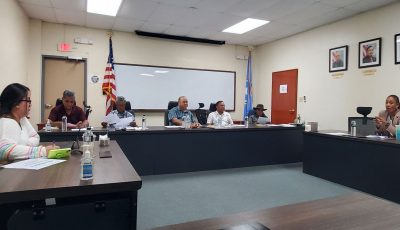BEFORE FINDING BROWNE IN CONTEMPT
Court gives IPI one more chance to show cause
The U.S District Court for the NMI has given Imperial Pacific International (CNMI) LLC one more chance to show cause—or to explain in writing—why its CEO should not be found in contempt and incarcerated because of IPI’s noncompliance with court orders.
District Court for the NMI Chief Judge Ramona V. Manglona issued an order last Wednesday stating that IPI must show cause in writing, no later than today, Dec. 4, why the court should not find IPI CEO Donald R. Browne in contempt for IPI’s failure to comply with court orders.
The court also wants IPI to explain why they should not enter an order demanding Browne to personally pay a fine of $500 per day until the fee award order is paid in full; that if a certification that the fee award order is not filed within seven days of this order, the U.S. Marshals shall take Browne into custody until the court determines that the fee award order has been paid in full; and why the court should not find IPI in contempt for its failure to comply with the fee award order.
The court allowed the plaintiffs—the seven former construction workers represented by Aaron Halegua and Bruce Berline—to file a response by Monday, Dec. 7.
Manglona set a hearing for Dec. 10, at 9am.
As a sanction for IPI’s noncompliance with its discovery obligations and prior orders of the court, the court ordered IPI on Aug. 25 to pay the plaintiffs’ attorneys’ fees in the amount of $93,834.25 within 30 days, by Sept. 24.
On Sept. 18, one week before that deadline, IPI filed a motion requesting an extension of time to pay, which was supported by a declaration from its CEO, Browne. The court granted a 30-day extension, ordering IPI to pay the full amount no later than Oct. 24, and make interim payments as soon as funds are available.
The court noted that, “as discussed in prior proceedings, IPI does have assets in the CNMI that could be liquidated so that its lawful debts can be satisfied.”
The court stated that no further extensions would be granted because the court had previously notified IPI of the possibility of needing to liquidate some of its assets or direct available cash flow to satisfy court orders rather than paying other expenses.
Despite the court granting this additional time to IPI, and again instructing IPI to liquidate assets if needed to comply with the court’s orders, IPI did not make even a partial payment of the fee award.
IPI also did not file any notice or explanation with the court prior to Oct. 24, let alone describe any efforts to liquidate its assets.
On Oct. 27, plaintiffs filed a “Notice of Noncompliance by Defendant IPI” informing the court that IPI had failed to comply with the fee award order. IPI still has not filed any response or explanation.
The court further notes that IPI has violated numerous prior discovery-related orders, which resulted in the court finding IPI in civil contempt, ordering that it pay a fine of $2,000 per day, and later entering a default judgment against IPI.
Despite the imposition of the $2,000-per-day sanction, which continues to accrue, IPI still has not complied with the court’s prior orders.
“In other words, monetary sanctions against IPI have proven insufficient to compel its directors and executives to take the steps necessary to comply with the orders of the court,” Manglona stated.



























